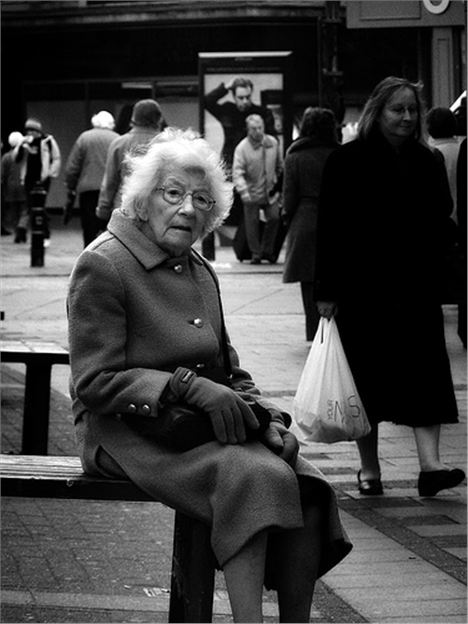CITY DWELLERS planning to retire to the country should reconsider living out their golden years in Manchester, says the Manchester City Council group dedicated to the causes of older people.
According to experts, staying in the city is arguably healthier and better for the economy than residing in rural areas.
They’ve been glancing at snapshots of the future, in which there's a silver-haired population of record proportions with unprecedented issues in accommodating with services for them.
By the way, forty-somethings, they’re talking about you.
For a generation, Manchester’s population of older people was shrinking, particularly in the areas adjacent to the city centre and in east Manchester, however these trends are expected to change in the years to come. In 2010, 16.7 per cent of the North West population was aged over 65, a figure not far off the average for the whole of England. This proportion is projected to increase to 22.5 per cent in the next 18 years, however, surpassing the projected average for the whole of England of 21.7 per cent.
“It’s very idealistic to think that if you have rolling hills you are necessarily going to be happy. What’s more important is a vibrant community, the ability to chat and visit with friends and even to go to the local town hall and complain.
Promising to be a landmark year for the UK’s ageing population, in 2030 the number of years we spend in retirement will equal the number of years spent as part of the country’s workforce.
This makes current services for older people such as transport, housing, health care etc, just the tip of the iceberg when compared to services that will be required in decades to come, reflective of a 34 per cent increase in users by 2030.
Manchester City Council want to be proactive. Their Valuing Older People (VOP) team garnered Manchester the sole UK recognition on the World Health Organisation’s (WHO) list of 'age-friendly' cities, a distinction they received last October after submitting an application and their plan of action.
Though the WHO has given Manchester a recognition largely for good intentions rather than accomplishment, awareness and forethought seem to be the primary factors where the WHO are concerned. In reality, the council is fighting an uphill battle as some services for older people have suffered in the past year as a result of funding cuts.
However, the VOP team have said they are committed to living up to the title and insist the WHO distinction won’t be an empty moniker. Last month they welcomed the first crop of students to their Ageing Studies Certificate programme, which aims to make Manchester’s workforce more age aware. Developed by the VOP team in partnership with Keele University, it’s the first course of its kind nationally. The course hopes to combat adversaries that are just as formidable as budget cuts – exclusionism and stereotypes.
“Older people should live in the countryside,” said one city resident who was interviewed for this article. “Surely that’s the best place for them.”
Undoubtedly, fresh air and verdant pastures are superior to city dirt and noise, but the preconception of heavenly retirement in the country can be erroneous, and even dangerous if older people become isolated in rural communities.
Without networks of friends, family and support, the health and quality of the lives of older people can be undermined, since isolation can lead to depression and distance from hospitals can translate into far worse, life-threatening consequences.
According to John Carling, Commission for Rural Communities’ chief executive, an isolated elderly person’s quality of life will depend on the services available. And in 40 years, it’s uncertain whether the economy will be able to provide services that keep older people in rural areas from being isolated.
Moving into rural areas and commuting in mid-life may mean that years down the line, through bereavement loss and the relocation of children to cities for work, one member of a family ends up living alone. Across the country, half of those 75-years-old and older live on their own, and though living alone doesn’t automatically lead to being lonely, it does increase its likelihood.
“It’s very idealistic to think that if you have rolling hills you are necessarily going to be happy,” said Councillor Sue Cooley, older peoples’ champion for MCC. “What’s more important is a vibrant community, the ability to chat and visit with friends and even to go to the local town hall and complain.
“We’re not suggesting that people who are happy in their communities should move into the city, but we are making sure that people don’t feel the need to move out of Manchester.
“It’s important that the city adopts an intergenerational approach, and ensures a high quality of life for everyone from young people to old.”
There is no regular list compiled by an agency or publication that ranks UK cities or towns as to how age-friendly they are, based on services, facilities, green spaces, and security, so for the time being there is no confirmation that Manchester is the outstanding winner in age-friendliness in comparison to other places.
Most councils, however, do not have their own older people teams in the first place, and the VOP group is already getting interest from other councils wanting to learn and recreate teams after their example.
“I’m a very happy customer,” said city centre resident Jeannette Chalmers, who moved to Manchester after the death of her husband to live in a flat owned and left empty by her daughter.
Now in her seventies, Jeannette’s reason for moving was proximity to her family, but she now loves her life in the city.
“It’s wonderful to use the city services and attend the events put on by the city council,” she said. “I enjoy the cinemas, the libraries, and the theatres and they are all right here on my doorstep.”
Some, however, will fail to share Jeannette’s positivity. Last week a series of staggering figures were published in an Age UK report, Agenda for Later Life: 16 per cent of people over state pension age are living in poverty, 3.3 million are unable to heat their homes, 800,000 are not receiving the care they need and 6 per cent of over 65s leave their houses once a week or less. The rising concern over pensions and healthcare is hardly creating a climate for optimism.
Part of the VOP’s initiative is to improve the lives of those Manchester residents who experience high levels of social exclusion, meaning they live in poverty and are excluded from social relationships, civic relationships, basic services and their neighbourhood.
The goals they outline include: creating better neighbourhoods for older people, increasing the income and employment of older people, increasing participation in cultural and learning activities, improving the health of older people and improving care and support for older people.
The VOP are quick to point out that improvements in these areas mean an improvement for everyone in the city, not just for older people. Everyone has an interest in improving services for the ageing population, for one reason that the VOP team doesn’t need research to foresee – we’ll all be with them one day.
Follow Karen on Twitter @KarenRegn












